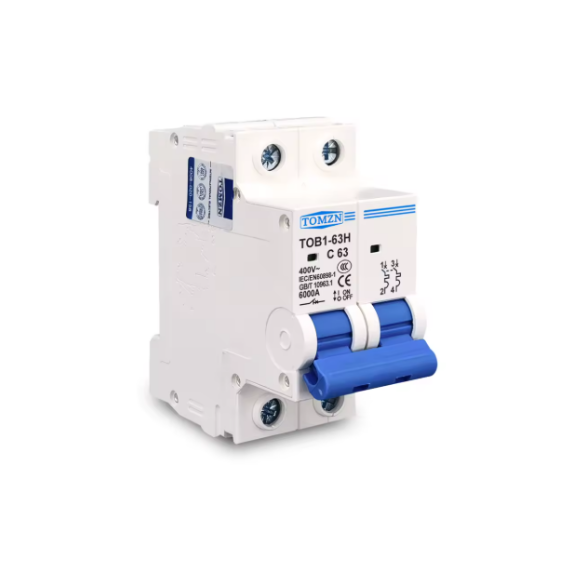
Fuses vs Circuit Breakers in DC Protection for Solar Installations
Share
Fuses vs. Circuit Breakers in DC Protection for Solar Installations
A Vital Safety Guide for South Africa's Booming Solar Industry
South Africa's solar industry is experiencing rapid growth, bringing sustainable energy to more homes and businesses. However, with this expansion comes the crucial need for electrical safety. Understanding the differences between fuses and circuit breakers, especially in Direct Current (DC) systems, is paramount. This guide will explain these differences and their importance in solar installations.
The Basics of DC in Solar Systems
Solar panels generate Direct Current (DC) electricity. This DC power flows from the panels, through wiring, and into an inverter, which converts it to Alternating Current (AC) for use in homes and businesses. Because of the nature of DC power, protection against overcurrents (excessive electrical flow) is critical. Overcurrents can cause fires and damage equipment. This is where fuses and circuit breakers come in.
Fuses: The Sacrificial Guardians
-
What is a fuse? A fuse is a simple safety device containing a thin metal wire or strip.
-
How does it work? When an overcurrent occurs, the wire inside the fuse melts (or "blows"), breaking the circuit and stopping the flow of electricity.
-
Key characteristic: A fuse is a one-time-use device. Once it blows, it must be replaced.
Circuit Breakers: The Resettable Protectors
-
What is a circuit breaker? A circuit breaker is a more complex device that also protects against overcurrents.
-
How does it work? When an overcurrent occurs, the circuit breaker trips, interrupting the circuit. It can be reset and reused.
-
Key characteristic: A circuit breaker is reusable. It can be reset manually or automatically.
Similarities Between Fuses and Circuit Breakers
Both fuses and circuit breakers share the primary goal of protecting electrical circuits from overcurrents. They both:
-
Interrupt the flow of electricity during an overcurrent or short circuit.
-
Prevent damage to wiring and equipment.
-
Reduce the risk of electrical fires.
-
Are essential safety components in electrical systems.
Key Differences: Fuses vs. Circuit Breakers
|
Feature |
Fuse |
Circuit Breaker |
|
Operation |
Melts a wire to break the circuit |
Trips a switch to break the circuit |
|
Resetting |
Must be replaced after blowing |
Can be reset and reused |
|
Response Time |
Generally faster |
Slightly slower, but still very fast |
|
Cost |
Lower initial cost |
Higher initial cost |
|
Maintenance |
Requires replacement after each overcurrent event |
Requires less maintenance; periodic testing is recommended |
|
Complexity |
Simpler design |
More complex design |
|
Visual Indication |
Can be difficult to visually determine if blown (some have indicators) |
Clear visual indication when tripped |
|
Reliability |
Highly reliable when sized correctly |
Highly reliable and provides consistent protection |
When to Use Which in Solar DC Protection
The choice between fuses and circuit breakers in a solar DC system depends on several factors:
-
Cost: Fuses are generally cheaper for initial installation.
-
Maintenance: Circuit breakers are more convenient in the long run due to their resettable nature.
-
System Size and Complexity: For smaller, simpler systems, fuses may be adequate. Larger, more complex systems often benefit from the features of circuit breakers.
-
Safety Requirements: Both provide excellent protection when correctly specified.
-
Specific Application:
-
Fuses: Often used to protect individual solar panel strings (a series of connected panels) from reverse current in case of a fault. String fuses are essential to isolate a faulty string, preventing damage to other strings.
-
Circuit Breakers: Commonly used for main DC disconnects, combiner boxes, and to protect the input of the charge controller or inverter. They provide a convenient way to isolate the system for maintenance.
Why AC Protection Doesn't Always Need Fuses
In AC systems, circuit breakers are the dominant protection device. This is largely due to the nature of alternating current:
-
AC Current Crosses Zero: AC current alternates direction, crossing zero volts many times per second. This makes it easier for a circuit breaker to interrupt the current flow.
-
Arcing is Easier to Manage: The zero-crossing property of AC helps to extinguish electrical arcs that can occur when a circuit is interrupted.
While fuses can be used in AC systems, circuit breakers offer more practical advantages for most applications, including the ability to reset and their effectiveness in handling the characteristics of AC power.
Protecting South Africa's Solar Future
As South Africa embraces solar energy, prioritizing safety is crucial. Correctly understanding and applying fuses and circuit breakers in DC solar installations will protect investments, prevent accidents, and ensure the long-term sustainability of this vital energy source. Installers and homeowners must:
-
Use components specifically rated for DC voltage and current.
-
Ensure all installations comply with South African electrical standards (SANS).
-
Consult with qualified solar professionals for system design and installation.
-
Regularly inspect and maintain their solar systems.
By taking these steps, South Africa can continue to grow its solar industry safely and effectively, bringing clean energy to all its citizens.
